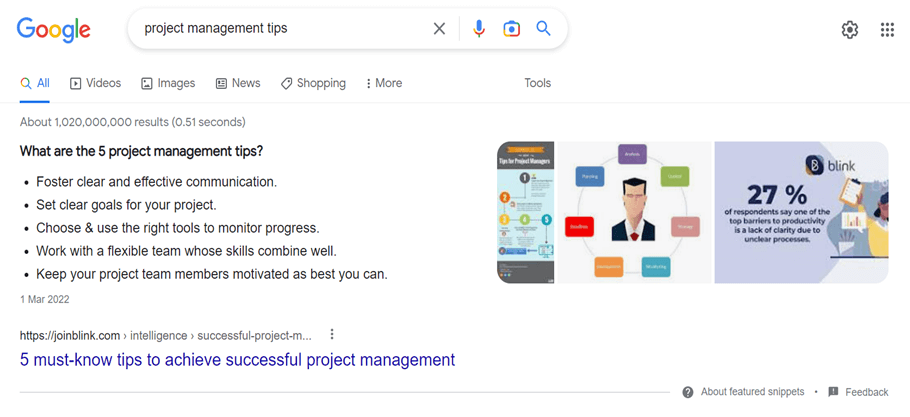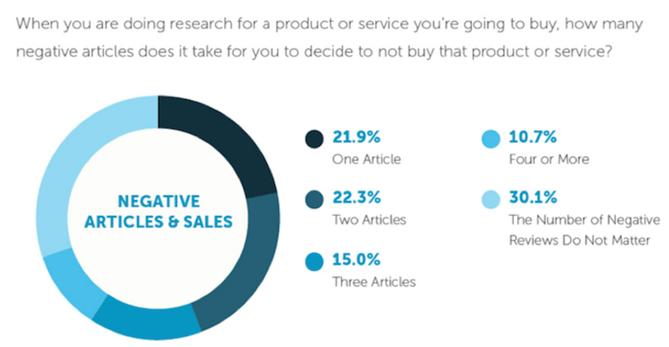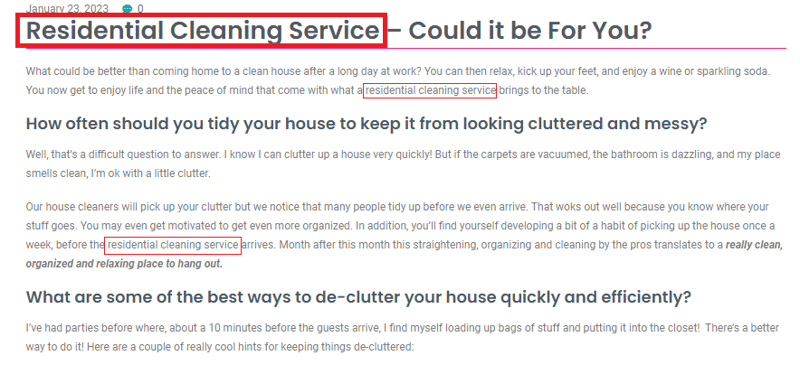A Guide to SEO Reputation Management: 3 Ways to Get (and Keep) Positive Results
Search engine optimization is a critical element of any digital marketing strategy and reputation management for businesses. Good SEO practices lead to high SERP (Search Engine Results Page) positions.
With consistently high SERP rankings, prospective customers in your target audience come to trust your business as a source of high-quality, valuable information.
This allows you to build brand authority and attract potential customers.
So, how do you leverage SEO techniques to maintain a positive reputation?
Let’s start by understanding what online reputation management in SEO is.
What Is Online Reputation Management in SEO?
Online reputation management in SEO focuses on keyword targeting and SERP rankings to paint the best possible positive image for a brand.
The ultimate goal is not just to have as much positive content about your brand online as possible. It’s also to have that content rank at the top of search engine results pages.
You want people to see how great you are as a result of your brand reputation when they perform a Google search related to your business.
Besides, the number one first page result in Google search results gets around 34% of organic traffic.

Essentially, SEO reputation management involves trying to improve the rankings of as many positive feedback results while pushing the negative results further down the SERPs.
You can do this by monitoring brand mentions and creating content that can also enhance website traffic.
Good SEO reputation management doesn’t just ensure you brand's reputation gets and remains in a positive light. It yields more long-term positive first page results for the company.
And when online reputation management is done the right way, every positive piece of content acts as glowing press releases and free public relations campaigns.
After all, when a brand has a good digital reputation, people are more likely to buy or invest in its products.
In other words, good SEO reputation management can lead to more conversions and sales for the company.
What Are the Consequences of a Bad Online Reputation for Search Engine Optimization?
Conversely, a bad online reputation can yield negative consequences for your company.
Here are a few things that you can expect to see as a result of negative online reputation management:
Drop In Organic Traffic
The first and most obvious consequence is a decrease in organic traffic. If you have a poor online reputation among your target audience, people are less likely to interact with your content.
After all, a business with too many negative reviews and a negative online reputation doesn’t have brand authority.
In other words, consumers don’t trust it as a source of industry information.
The sad thing is that even if the people within a company that has a poor online reputation create great products, things like too many negative reviews will outweigh potential customers' desire to give them the time of day.
Ultimately, once you have a negative reputation, it becomes very difficult to compete against other competitors for organic search traffic.
Negative Brand Value
A bad reputation decreases the value of your brand. If this starts to pile up, it can negatively affect your market position.
Consumers who once saw you as a trusted brand will start to change their minds and go to your competitors instead.
What’s worse, with modern technology and people's ever-growing social media presence, it doesn’t take long for news to travel.
Even influencer marketing might not be enough to turn your poor online reputation around. In fact, a "deinfluencing" trend that took off on TikTok has seen influencers using their personal brand to tell their followers what not to buy.
So, customer reviews that contain negative feedback showing up across online review sites and negative content appearing in search results like product review articles related to your business should set off alarm bells.
Decreases in Profitability
This final consequence of a bad digital reputation comes as a result of the two outlined above.
Although it may take some time to become apparent, a negative reputation will have a negative financial impact on a business.
The reasons for this are pretty simple. As we mentioned, over time, a bad online reputation drives customers away to your competitors.
A study by Moz showed that one piece of negative content could cause a business to lose 21.9% of potential customers.

What's worse? This percentage increases with every negative article, reaching as high as 70% with four or more negative articles.
The data highlights how a poor online reputation can quickly result a decrease in profitability.
How to Use SEO for Online Reputation Management
It’s clear that SEO reputation management is key to a successful business's digital marketing strategy. But how can you leverage SEO for online reputation management?
Let's take a look.
1. Optimize Existing Brand-Positive Content for Search Engines
We’ve mentioned that a critical part of effective search engine optimization is improving the ranking of your positive search results.
Positive search results can be content that you create yourself that reflects well on your business (for instance, blog posts).
It can also come in the form of content created by others such as positive reviews or positive mentions in articles, or YouTube videos.
In a way, you have no direct control over the positive online reviews and articles from outsiders.
You do, however, have control over your own. So, the question is, how do you improve the ranking of your existing positive content?
You should regularly update and optimize it to ensure it performs well in SERPs. To do this, make sure it covers relevant topics that your target audience will be interested in in the first place.
Think about it...
If your content is about topics people don’t read about, you’re not likely to show up in SERPs. After all, people won’t even bother to search for those topics.
When updating your content, use SEO software, too.
You want to see what keywords to include to have the best possible chance of ranking for related search terms.
But you should try to rank for these high-value keywords without shoehorning them unnaturally. Your target audience will notice.
Check out this example from The Dazzle Cleaning Company based in Seattle:

The blog post above has the keyword “residential cleaning service” scattered in appropriate instances across the article.
So, when someone in Seattle uses the search term “residential cleaning service,” they find the company among the top first page results.
But it’s not enough for your content to be updated on the right keywords and the right topics. Your content should be high-quality and well-researched, too.
SEO techniques alone are not enough to improve your rankings. Your content, which is a reflection of your company's reputation, must be valuable to obtain traffic and attract links from other sites in your industry. That also helps to boost your SERP positions over time.
2. Write New Content for Authoritative Websites
Negative searches can come in the form of negative reviews of your products or negative feedback in blog post or YouTube video comments.
The easiest way to reduce negative search results for SEO reputation management is to drown them out with positive search results.
The question is, apart from existing website content, what constitutes positive search rankings for you?
Your own content published on other websites, of course. The process of writing for these third-party sites is called guest-posting.
But for guest posting to be effective as an SEO reputation management strategy, you need to write high-quality articles for authoritative websites.
Remember, you want this new content to appear at the top of SERPs for it to hopefully drown out negative search results.
What are more likely to appear at the top of SERPs given a search query? Authoritative websites.
As an effective SEO reputation management strategy, guest posting can also help boost your existing website content’s ranking, too, through backlinks.
Backlinks are an important ranking factor. After all, search engines — especially Google — see them as the authoritative website’s vote of confidence in your content.
To gain visibility for your new content on these authoritative sites, make sure to implement content marketing promotions.
3. Claim and Use Your Social Media Accounts
Social media sites almost always appear at the top of Google's search results in a brand search. The same rings true for all great search engines.
If they exist and you want to help push negative search results about your brand further down the SERPs, you need to claim these social media accounts. The same goes for your Google Business Profile.
And why wouldn't you? They're yours and, well, it's free social media marketing.

Make sure you complete your social media profiles. That includes your profile picture and company description.
But claiming those social media sites isn’t enough. Customers can post comments on your social media platforms after using your product or your service.
While doing online research, you need to be on the lookout for any possible negative reviews about your brand, humbly apologize, and end on a positive, incentivized note to try and maintain your online reputation.
You can even use social media tools to monitor brand mentions so that you can catch negative results and address negative feedback quickly and gracefully.
Remember, social media profiles appear at the top of SERPs — especially for branded search queries — and are likely to be clicked.
You don’t want people to see negative comments on social media posts in the wild about your brand and form their own perceptions about you based on those.
As a business owner, you really do have the power to turn a negative story into a positive one.
Just see the excellent response of an Italian restaurant owner on Facebook to a negative online review:

Instead of making excuses, he immediately apologized to the customer. But he didn’t stop there.
He offered the customer a free meal to compensate for the restaurant’s possible shortcomings. Anyone who sees that will conclude the restaurant owner truly cares.
And now, people who want to try that Italian restaurant and see that negative review will also see the owner's fantastic response and, hopefully, still choose it for their dining experience.
It's a perfect case case study in how to respond to negative online reviews and you can bet their brand's reputation hasn't suffered because of it.
In Closing: Grow Your Business with Online Reputation Management SEO
A brand's online reputation management strategy is key to the success of a business.
Whether you decide to use an online reputation management company or take ownership of it yourself, the most important thing to do is start.
Actively start turning those negative online reviews into positive reviews. Scour review sites and search engines for negative results and get the brand reputation you deserve.
The more brand-positive content people see, the more likely they’ll form a good perception of you.
You can see the importance of in the consequences of having a bad online reputation: a decrease in organic traffic and in overall profitability as the brand loses value.
The good news is, SEO reputation management is a powerful tactic that you can start using today.
Good SEO practice can help increase the ranking in SERPs of content that portrays your brand in a positive way. It can help push down content that portrays you in a negative way, too.
In this article, you learned how to use SEO as part of an online reputation management plan to:
-
Optimize existing brand-positive content
-
Write valuable new content for authoritative websites
-
Leverage your social media profiles
Follow these SEO reputation management strategies, and you’ll reap the best first page results. Good luck!




